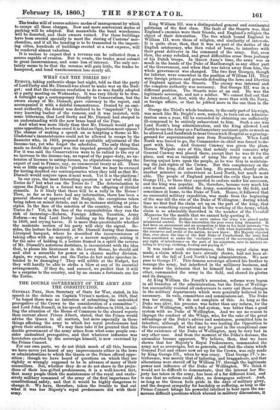WHAT CAN THE TORIES DO ?
RUMOUR, taking authentic shape last night, told us that the party of Lord Derby and Mr. Disraeli was about to make war on the Bud- get ; and that the valorous resolution to do so was finally adopted at a party meeting on Wednesday. It was very likely to be true. A fortnight ago a contemporary friendly to Conservatism, but the sworn enemy of Mr. Disraeli, gave currency to the report, and accompanied it with a doleful remonstrance. Denied by an emi- nent authority, the denial was declared to be "impudent" by the very knowing backer of the rumour, and it was insisted, with some bitterness, that Lord Derby and Mr. Disraeli had stooped to an understanding with the new brass band of the Pope. And what was more likely than that Mr. Disraeli would get up some opposition, he whose creed it is thatan Oppositionmust oppose ? The chance of making a speech on so tempting a theme as Mr. Gladstone's inconsistencies could not be allowed to escape by the financier who, in 1852, proposed an equitable adjustment of the Income-tax, yet who forgot the schedules. The only thing that made us doubt the report was the imputed grounds of opposition. For it was said the Conservatives were to be rallied to the cry of no increase to the income-tax, no repeal of the paper-duty, no ex- tension of licenses to eating-houses, no stipulations respecting the export of coal to France, nay, no commercial treaty at all. There was so little sagacity in this " platform " that we may be excused for having doubted our contemporaries when they told us that Mr. Disraeli would conjure upon it next week. Yet it is the platform ! In our eyes, the most interesting question is not what will the Tories do ? but what can the Tories do ? The determination to oppose the Budget in a formal way was the offspring of divided councils. Is it likely that there will be a rally in the House ? Then, so far as we have had any information, there has been a general Chorus of approval of the Budget, the exceptions taken being taken on minor details, and in no instance striking at prin- ciples. In the face of the sanction of the country, what can the Tories do ? Yet, in the face of the responsibilities they run the risk of incurring—Reform, Foreign Affairs, Taxation, Army Reform—we find Lord Derby holding up his finger as he did in 1858, and crying havoc. It is more than questionable whether the moderate section of his party will obey the signal. Be- sides, the lecture he delivered at Mr. Disraeli during that famous Liverpool banquet, where he described the inconveniences of taking office with no majority, or a narrow majority, seizing it for the sake of holding it, a lecture framed in a spirit the reverse of Mr. Disraeli's notorious doctrines, is inconsistent with the idea that, to please his lieutenant in the Lowet House, he should aid and abet a scramble for power on a chance medley division. Again, we repeat, what can the Tories do but make speeches in- tended to be damaging ? They will nibble at the Budget, but they will hardly be able to strike a blow at any of its essential arrangements. If they do, and succeed, we predict that it will be a surprise to the country, and by no means a fortunate one for the Tories.


























 Previous page
Previous page